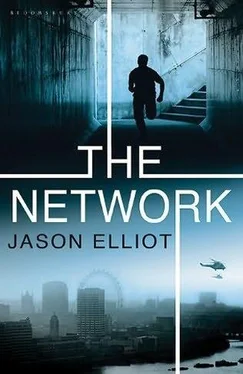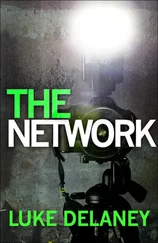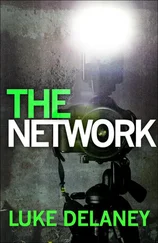Jason Elliot - The Network
Здесь есть возможность читать онлайн «Jason Elliot - The Network» весь текст электронной книги совершенно бесплатно (целиком полную версию без сокращений). В некоторых случаях можно слушать аудио, скачать через торрент в формате fb2 и присутствует краткое содержание. Жанр: Триллер, на английском языке. Описание произведения, (предисловие) а так же отзывы посетителей доступны на портале библиотеки ЛибКат.
- Название:The Network
- Автор:
- Жанр:
- Год:неизвестен
- ISBN:нет данных
- Рейтинг книги:4 / 5. Голосов: 1
-
Избранное:Добавить в избранное
- Отзывы:
-
Ваша оценка:
- 80
- 1
- 2
- 3
- 4
- 5
The Network: краткое содержание, описание и аннотация
Предлагаем к чтению аннотацию, описание, краткое содержание или предисловие (зависит от того, что написал сам автор книги «The Network»). Если вы не нашли необходимую информацию о книге — напишите в комментариях, мы постараемся отыскать её.
The Network — читать онлайн бесплатно полную книгу (весь текст) целиком
Ниже представлен текст книги, разбитый по страницам. Система сохранения места последней прочитанной страницы, позволяет с удобством читать онлайн бесплатно книгу «The Network», без необходимости каждый раз заново искать на чём Вы остановились. Поставьте закладку, и сможете в любой момент перейти на страницу, на которой закончили чтение.
Интервал:
Закладка:
More than an hour passes, but eventually the men leave the building and return to the vehicles. H is watching as one of the Talibs gets into the passenger seat of the pickup.
‘Bollocks,’ he hisses. ‘Things have just got more complicated. They’ve given us an escort. Time to move.’
We leave the ridge, ascend the slope on the far side of the valley and make our way down again along a wide ravine towards the floor of the neighbouring valley, keeping enough height to be able to scan the villages on the far side of the river. There are clusters of low adobe buildings at intervals along the length of the far bank, but we’ve no way of knowing the exact position of the village where we’ve agreed to meet the others. All we can do is get as close to it as we can determine from the map and wait for nightfall.
It’s a huge relief when, on the far side of the river about a third of a mile away, we spot the signal we’ve been hoping for. It’s the satphone, blinking in infrared mode, which I’ve fixed to the roof pouch inside the G-Wagen. Through the Kite sight it’s as distinct as a parachute flare but invisible to the naked eye.
At our chosen point by the water’s edge H lays all our kit carefully in the centre of the tarpaulin we’ve brought, to which we add our folded clothes after stripping to our underwear. Around everything he lays brushwood for flotation and then rolls the tarpaulin over the contents and ties the ends of the bundle tightly with two lengths of paracord. Then he folds the ends over the centre and ties them again. Finally he cuts two short lengths from the black climbing rope, ties a triple bowline at the end of each, and steps into the loops he’s tied.
‘Second man ties on with the kit using this,’ he says, clipping a small karabiner onto the improvised slings he’s made for me and Momen. ‘Last man ties on to the far end.’ He loosens the remaining coils and passes me the rope. ‘Pay out and try not to let go. I’ll signal you from the far side.’ He screws a red filter over the head of a small torch. ‘Give me time to get opposite you.’ He waves the torch. ‘Side to side for OK and up and down if there’s a problem and you need to wait.’
Momen and I watch as he steps into the whispering black water and looks back at us.
‘I bloody hate cold water,’ he says, and there’s just enough light for me to make out the grimace on his face. Then he pushes off and quickly disappears from sight. There’s a steady tug on the rope from the current as he swims across, tracing a diagonal twice the width of the river as he’s carried downstream. I’m peering along the length of the rope, trying to picture how far he’s gone, but the pull on the rope is steady and I can’t tell where he’s ended up.
It’s Momen who sees the signal first on the far side opposite us. It looks like a cigarette glowing in the distance, and it’s waving side to side. Momen ties on, and we loop the bundle that H has made onto the rope.
‘Boro bekheir,’ I say. Go well. And then he too disappears into the blackness.
When I see the red glow of the torch for the second time, I detach the rope from the boulder we’ve secured it to and step into the flow. It’s unpleasantly cold and I hear myself swearing inventively. Then all thoughts fade as I swim as hard as I can, feeling glad of the tension on the rope as the others pull me across from the far side. I’m trembling violently when in the darkness I’m suddenly aware of hands pulling me onto the bank. We hurriedly unpack our kit and retrieve our clothes. Everything is perfectly dry.
It sounds straightforward. You need to leave a vehicle, let it go through a checkpoint and rejoin it the other side. But several factors make this apparently simple scenario more problematic than it sounds. It’s dark and you’re cold. You’ve got cuts and bruises on your body which demand attention you can’t give them. You don’t know the terrain. Your vehicle now has an armed and potentially hostile escort, and your sole human link with safety can only communicate with you in secret, via a two-way radio that he can’t use. Your friends also appear to be lying up in a small settlement nearby, where there are other civilians, so you can’t simply charge in because word of your presence will reach the wrong people far too soon for your purposes. So you will have to somehow deal with the armed escort, and do so in such a way as to not be observed. But you don’t know which building to enter, because you don’t know where anyone is. You are not in a film, where such things are achieved without hesitation or doubt, and unfold with magical ease. You are instead cold, frustrated, tired, hungry and you have no choice but to wait and watch, and perhaps pray, hoping it doesn’t get any colder.
By late morning the following day, I have my first insight into what it must feel like to belong to a criminal gang or team of kidnappers. There is something powerfully attractive to it. In the back of the G, somewhat resembling a nodding dog on the back shelf of a car only with an Afghan scarf tied over his head, the Talib escort has become our reluctant passenger.
We owe our success in part to Aref, who as night falls leaves the room where they’re all gathered on the pretext of paying a visit to the outdoor privy, from where he contacts us in a whisper on the two-way radio. They’re staying at a primitive mehman-khana with several others travellers, and there’s nothing to be done until the morning when they all leave.
So we wait for the dawn, taking two-hour stretches on watch in a dried-up irrigation ditch which, if cold, is surprisingly comfortable. It’s the nearest we can get to the vehicles, which are several hundred yards away, without breaking cover. In the early morning we all hear the triple burst of static on the radio as Aref attempts to alert us. A few moments later we hear the urgency in the near-whisper of his voice.
‘Come now,’ he says.
We’re about thirty yards from the vehicles when the others emerge from a nearby building. Momen waves to them. Aref and Sher Del wave back as if they’ve seen an old friend. The Talib escort turns in our direction as we walk up, and we see the look of uncertainty come across his face as we approach, but he makes no move for his weapon. He’s in his early twenties. The tail of his black turban hangs over his left shoulder. The look of uncertainty turns to confusion as H cocks his Browning and lines it up on the Talib in a swift and unambiguous motion. I follow up with Mr Raouf’s AK-74, and all that remains is for Sher Del to lift the victim’s weapon from his shoulder and put it on his own, and then for H to tie a scarf around his bewildered features.
‘We don’t want him doing much sightseeing,’ he says as he tightens the knot. ‘He can come in the G with us. That way he doesn’t get to overhear anything except my bad English.’
We have a certain sympathy for our extra passenger, at whose expense we’re unable to resist a few jokes.
‘Do you think he’s got a mobile? Ask him to call his girlfriend so she can come and pick him up later,’ says H.
‘He says he hasn’t got a girlfriend. But he’s got a nice-looking donkey who he misses a lot.’ And so on, because for the time being we have the advantage.
A single range of mountains separates us from our objective. In a straight line we are a little more than fifteen miles from the fort, but there’s no way to cross the range with vehicles, so we’re forced to take a route that is three times the distance and loops north and then south again around the mountains. It takes all day and half the following day. A few miles from the target we pass through a small settlement called Kadjran, where we stop to buy a few supplies. We don’t stay long, because we don’t want to be noticed, and camp out in a high deserted fold of the hills, where the GPS tells us we’re only half a mile away from the fort.
Читать дальшеИнтервал:
Закладка:
Похожие книги на «The Network»
Представляем Вашему вниманию похожие книги на «The Network» списком для выбора. Мы отобрали схожую по названию и смыслу литературу в надежде предоставить читателям больше вариантов отыскать новые, интересные, ещё непрочитанные произведения.
Обсуждение, отзывы о книге «The Network» и просто собственные мнения читателей. Оставьте ваши комментарии, напишите, что Вы думаете о произведении, его смысле или главных героях. Укажите что конкретно понравилось, а что нет, и почему Вы так считаете.












